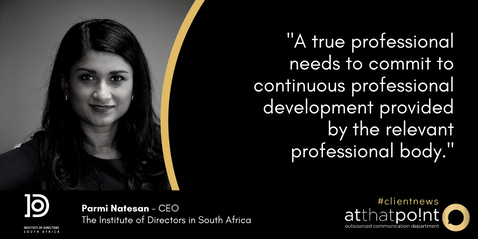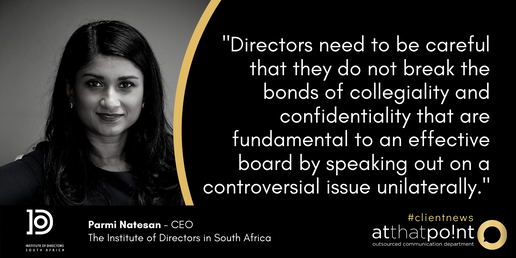|
The Institute of Directors in South Africa (IoDSA) has welcomed the news that government officials will have to attend online ethics training as part of a concerted effort to professionalise the public service. However, says Parmi Natesan, CEO of the IoDSA, it must be recognised that ethics is only part of what is needed.
“The Department of Public Service and Administration is to be congratulated on this initiative, but one also needs to be aware that ethics training is not a silver bullet, as the true test will be the resultant practice and enforcement thereof. Ethics has to also be seen as part of a broader governance framework and this kind of training will only yield results if it is complemented by compulsory training in other governance areas,” Ms Natesan explains. Aside from recommending a broader training approach to include other important governance topics, thought needs to be given to what it takes to create a professional public service. Professional organisations around the globe have certain things in common, two of the most important of which are continuous professional development and a code of conduct to which their members can be held accountable. “Professionals have to keep up with developments in governance and their area of expertise—nothing stands still. A true professional thus need to commit to continuous professional development provided by the relevant professional body,” she says. “As important, true professionals need to be accountable for their actions, and that’s arguably especially true for public servants. It’s thus important that they sign up for a code of conduct to which they can be held accountable. “For all these reasons, we would urge the Minister to take an integrated approach in order to build a professional public service successfully.” She goes on to argue that special attention needs to be paid to the training of leaders within the public service—there is clear evidence that the “tone at the top” influences the culture and attitude of the entire organisation quite profoundly. As the IoDSA has pointed out on numerous occasions, the nomination process for public officials, particularly those within state-owned enterprises, should follow a transparent and rigorous process as outlined in King IV in order to ensure that leaders not only have the right skills and experience but also understand their duties to the organisation. The IoDSA’s recent paper, “Challenges facing Public Sector Boards”, advocates that leadership appointments should be subject to an objective due diligence process conducted by a competent third party. This is vital because, as King IV emphasises, ethical and effective leadership go together. “It’s common cause that the public service has a critical role to play in ensuring a capable state that can deliver on its commitments to the citizenry. The move to professionalise the public service is welcomed, but a multi-faceted approach is essential,” Ms Natesan concludes. ENDS MEDIA CONTACT: Stephné du Toit, 084 587 9933, [email protected], www.atthatpoint.co.za For more information on the IoDSA please visit: Website: www.iodsa.co.za Twitter: @The_IoDSA LinkedIn: Institute of Directors in South Africa Company Page
0 Comments
A recent tweet made by a director of Cricket South Africa relating to a cancelled sponsorship highlights an issue for South African boards: the risk represented by social media. Social media have become a key communications channel, but they pose particular risks for organisations and especially their directors, says Parmi Natesan, CEO, Institute of Directors in South Africa (IoDSA).
“The bottom line is that directors have to accept that once they take up a board position, they will be seen as representing the organisation in the world of social media. The social media world has its own rules and culture, and there’s no distinction between public/professional and private roles,” she says. “Directors’ duties to act in the best interests of the organisation, with due care, skill and diligence are paramount, and it should never be forgotten that they can be held personally liable for not fulfilling these duties.” Those using social media need to take the time to gain the necessary skills to communicate in an environment in which context is completely absent. Observations that might be unexceptionable in the real world can be perceived quite differently in the online world—and perception is everything in the virtual world. Board members cannot afford not to be proficient in social media themselves, and must give careful thought to their role in the organisation more generally. Because mishaps can cause grave reputational damage in the blink of an eye, social media should be considered in the risk management process with a corresponding policy to manage them, just as is the case with traditional media, Ms Natesan argues. Social media policy and official activity is all too often relegated to the marketing department, and seen as the preserve of younger, more junior staff members. At the very least, the board must ensure that a social-media policy is in place and has been approved by the board, and that all staff members and directors understand what it means for them. A key challenge is that social media often requires swift action, so policies must be carefully crafted to provide a framework within which everybody associated with the organisation can work, with provision made for the rapid vetting of potentially damaging tweets. Ms Natesan recommends that directors should restrict their social media comments to business and financial matters of a general nature and that if they feel there is a specific issue that needs addressing, they should take it to the social and ethics committee, the board or the official spokesperson. “Directors need to be careful that they do not break the bonds of collegiality and confidentiality that are fundamental to an effective board by speaking out on a controversial issue unilaterally,” she says. Many social media policies also fail to provide any framework in terms of which transgressors will be disciplined. It is therefore recommended that social media policies are linked to the IT use policy and the disciplinary code. ENDS MEDIA CONTACT: Stephné du Toit, 084 587 9933, [email protected], www.atthatpoint.co.za For more information on the IoDSA please visit: Website: www.iodsa.co.za Twitter: @The_IoDSA LinkedIn: Institute of Directors in South Africa Company Page |
Archives
July 2024
Categories
All
|



 RSS Feed
RSS Feed